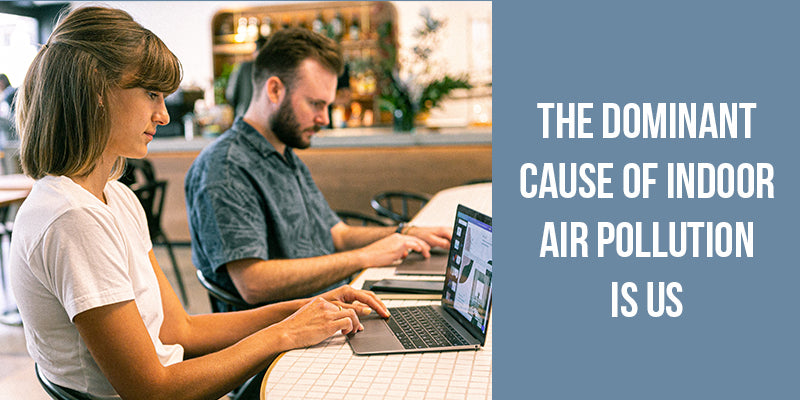The Dominant Cause of Indoor Air Pollution is Us
Posted on December 30 2020

The impact of air pollution on general health, and the risk of developing cancers, lung disease, or heart disease has been studied for a long time. However, when many of us think of air pollution we see smog-filled metropolitan areas and that is not always the case. A recent study from Purdue University found that humans are the dominant cause of pollution in indoor air spaces due to VOCs emitted by the people there.
Volatile organic compounds (VOCs) are organic chemicals that have a high vapor pressure at ordinary room temperature. They include both man-made and naturally occurring chemical compounds.
Why is this a problem? Many people spend 40 hours a week working and most of that time, if not all, is spent in an office space. This can affect the workers overall health and working productivity. The research team studied how indoor air quality is determined adequately and what the main causes of pollutants are.
“Our preliminary results suggest that people are the dominant source of volatile organic compounds in a modern office environment,” Boor said. Most scents or odors are of VOCs which poses a problem because people use scented personal care products daily.
Two of the top volatile compounds that reduce air quality and human health are isoprene and D5 Siloxane. Isoprene is a flammable substance present in essential oils used for scent in personal care products like deodorant. D5 Siloxane, short for decamethylcyclopentasiloxane, is a common ingredient added to shampoos and lotions and other personal care products to give them a smooth, silky feeling. Both chemicals are designed to evaporate. Once released into the atmosphere, sunlight can catalyze reactions between VOCs, nitrogen oxides and other compounds to form ozone and particulate matter—two types of pollution that are regulated because of their effects on air quality and human health.
“We found levels of many compounds to be 10 to 20 times higher indoors than outdoors. If an office space is not properly ventilated, these volatile compounds may adversely affect worker health and productivity.”
Effects from VOCs
- Eye, nose, and throat irritation
- Shortness of breath
- Headaches
- Fatigue
- Nausea
- Dizziness
- Skin problems
Higher concentrations or extended exposure can cause irritation of the lungs, damage to the liver, kidney, or central nervous system. Some VOCs are suspected of causing cancer. Research continues to better understand the long term effects of exposure to VOCs.
How to avoid exposure to VOCs
- Use cleaning products that are chemical free. (Read labels and do research to avoid green washing)
- Only buy enough products for immediate use instead of storing extra
- Store products as far away from worker areas as possible (outdoors or basement if possible)
- Minimize scented products such as, plug-ins, aerosol deodorizers, candles, and incense
- Consider storing new office furniture and supplies for a few weeks so they can emit the strongest gases first. (Proper ventilation would speed this process along)
- Increase ventilation by opening windows and doors as much as possible, especially after bringing in new products
- Use personal care products that are chemical free (deodorant, lotions, shampoos, washes, etc.)
- Avoid wearing perfumes
- Avoid wearing freshly dry-cleaned clothing, allow them to sit in the bag in a ventilated area for at least a few days
Resources:
Comments
0 Comments
Leave a Comment